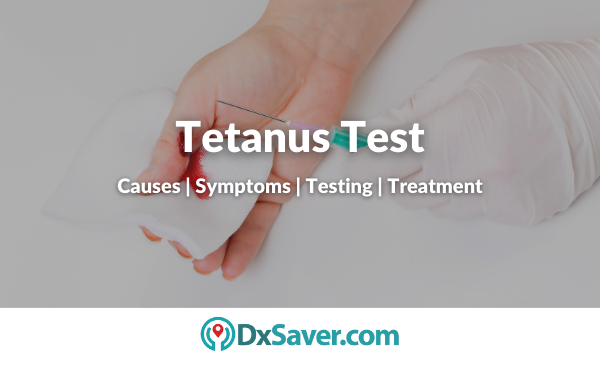
Tetanus also called lockjaw is a serious infection that can affect the brain and nervous system, leading to stiffness in the muscles. You may also experience stiffness and spasms in various muscles, particularly those in the jaw, abdomen, chest, back, and neck. Tetanus can be life-threatening without treatment. According to CDC, about 10-20% of tetanus infections are fatal. Cases of tetanus are rare in the United States and other parts of the developed world due to the widespread use of vaccines. Yet tetanus remains a threat to people who aren’t up to date on their vaccinations. And tetanus infection is more common in developing countries.
This article covers all the significant topics related to the tetanus test such as the test cost, causes, symptoms, treatment, and how to get tested for a tetanus test.
- What is tetanus?
- Causes of tetanus
- Tetanus symptoms
- Risk factors
- Complications
- What is a tetanus test?
- How should you prepare for a tetanus test?
- What happens during the tetanus test?
- Risk of tetanus test
- Treatment for tetanus
- How to prevent tetanus?
- Provider locations
For our readers who are interested in knowing the tetanus test cost beforehand, we begin with that section.
How much does the tetanus test cost?
Tetanus test costs range from $138 to $149 in different labs and facilities across the US. Prior appointment isn’t required. You can order tests online by comparing the price or visiting the nearest lab during lab business hours. You will get the results in your email in 2 to 3 business days after completing the procedure. Apart from this, doctor consultation is available for any kind of further treatment or medical advice.
The table below shows the tetanus test provider and their prices. You can know more and book the test by clicking on the “Book Now” button.
Name of our Partner Labs | Book Online at Offer Price |
HealthLabs
| $149 |
Personal Testing Lab
| $138 |
Tetanus test cost with insurance
Many insurance companies in the U.S. cover all the vital tests like the tetanus test. However, the coverage provided by private health insurance companies and national health insurance programs like Medicare varies widely. Most of the health insurance policies cover tetanus test costs only once or twice a year and when your physician orders more than twice in a year, you should pay the test cost out of pocket. So, you are recommended to check if your health insurance policy covers the tetanus test cost.
Our tetanus testing providers do not accept any kind of health insurance policy. However, they can provide you with an itemized receipt containing all the details viz the name of the test, code of the test, and CPT code which is necessary for insurance reimbursement purposes.
What is tetanus?
Tetanus is a serious bacterial infection caused by spores of the bacterium Clostridium tetani. The spores are found everywhere in the environment, especially in soil, ash, intestinal tracts, or feces of animals and humans, and even on the surfaces of skin and rusty tools like nails, needles, or barbed wire. This infection can affect the nervous system and cause muscles throughout the body to tighten. And it can eventually spread to other body parts.
Fortunately, tetanus is preventable via a vaccine. But this vaccine does not last forever and booster shots are needed every 10 years to ensure immunity. Tetanus is rare in the United States and only about 30 cases occur a year. And these are mostly people who haven’t been vaccinated against tetanus or who have not kept up their booster shots every 10 years.
Causes of tetanus
The bacterium called Clostridium tetani causes tetanus infection. This bacterium can survive in a dormant state in soil and animal feces and it’s shut down until it discovers a place to thrive. You can become infected when the spores of this bacteria enter your bloodstream via a cut or deep wound. Then these spores spread to the central nervous system and produce a toxin called tetanospasmin. And this toxin is a poison that blocks the nerve signals from your spinal cord to your muscles and leads to severe muscle spasms.
However, tetanus infection is not contagious from person to person. Though tetanus occurs worldwide, it is more common in hot, damp climates with rich soil. And is more common in densely populated areas.
Tetanus symptoms
The incubation period between exposure to the bacteria and the onset of illness is between 3 and 21 days. Generally, symptoms appear within 14 days of initial infection. Symptoms of tetanus may include:
- Jaw cramping
- Muscle spasms
- Painful muscle stiffness all over the body
- Trouble swallowing
- Jerking (seizures)
- Headache
- Fever
- Changes in blood pressure and heart rate
- Bloody stools
- Diarrhea
- Sensitivity to touch
- Sore throat
- Sweating

Risk factors
People who have not been immunized against tetanus are at the greatest risk factor for tetanus infection. And even people who are not keeping up with the 10-year booster shots are also at risk. Other factors that increase the risk of this infection may include:
- People who work with soil or in dusty environments
- Wounds or cuts exposed to soil or manure
- A foreign body in a wound (like a nail or splinter)
- A history of immune-suppressing medical conditions
- Infected skin lesions in people with diabetes
- An infected umbilical cord if a mother is not fully vaccinated
- Intravenous drug users
Complications
The complication of tetanus infection may include:
- Blockage of the main artery of the lung by a blood clot that has traveled from elsewhere in the body via the bloodstream (pulmonary embolism)
- Pneumonia – a lung infection
- Breathing difficulty, possibly leading to death (about 1-2 in 10 cases are fatal)
- Brain damage due to lack of oxygen
- Abnormal heart rhythm
- Bone fractures and fractures of the spine (due to convulsions and muscle spasms)
- Secondary infections due to prolonged stay in hospital
Tetanus test
The earlier the diagnosis, the more effective will be the treatment will be. Doctors will perform a physical exam to check for symptoms of tetanus like muscle stiffness or painful spasms. Usually, a patient with muscle spasms and stiffness who recently had a wound or cut can be diagnosed quickly.
Unlike other diseases, tetanus is not typically diagnosed via laboratory tests. But doctors may perform laboratory tests to help rule out diseases with similar symptoms. It may include meningitis, a bacterial infection that affects the brain and spinal cord, or rabies, a viral infection that causes brain swelling. And your doctor will also base a tetanus diagnosis on your immunization history.
How should you prepare for a tetanus test?
You don’t need to take any special measures to prepare for the tetanus test.
What happens during the tetanus test?
A tetanus test requires a blood sample. Before drawing the blood sample, the nurse or healthcare professional will clean the area with an antiseptic to kill germs. And they will tie a band around the upper arm to make your veins swell with blood. Once a vein is found, your health care professional will insert a sterile needle into it and the blood is drawn into a tube attached to the needle. You may feel slight pain when the needle goes in/out. After taking the sample, they will remove the needle and place a bandage over the site. Usually, this test takes only a few minutes.
Risk of tetanus test
There is little risk in having a tetanus test. You may have bruising or minor bleeding in the area where the needle was inserted. However, the symptoms go away quickly.
Treatment for tetanus
There is no cure for tetanus infection. It is essential to seek hospital treatment immediately when tetanus does develop. The treatment of tetanus will depend on the severity of your symptoms. Tetanus can be treated with different therapies and medications, it may include:
- Cleaning the wound to eliminate the source of the bacteria
- Antibiotics (like penicillin) to kill the bacteria
- Tetanus immune globulin or TIG to neutralize the toxins that the bacteria have created
- Muscle relaxers for controlling muscle spasms
- Sedatives slow the function of the nervous system and help to control muscle spasms
- A tetanus vaccine may also be given along with the treatment
Apart from this, other medications may be used to regulate involuntary muscle activity like heartbeat and breathing. And in this case, morphine may also be used for this purpose and sedation. A surgical procedure called debridement is done to remove infected or dead tissue in a few cases. And when a person feels difficulty in swallowing and breathing, they may require a breathing tube or ventilator.
How to prevent tetanus?
Most cases occur in people who have never had the vaccine or who didn’t have a booster shot. And vaccination can prevent tetanus, but only when you receive booster shots on schedule. In the US, the tetanus vaccine is given to children as part of the diphtheria-tetanus-pertussis shot or DTap shot. Adults require a booster vaccine called the Td vaccine every 10 years after that whereas, in children, they need to get a booster shot at 11 or 12 years of age. Make sure to check with your doctor if you are not sure if you are up to date on your shots. Proper treatment and cleaning of wounds can also help prevent the infection.
Provider locations
A tetanus test can be done at any of our partners 4500+ labs located across the US. To know the tetanus tests cost, refer to the first section of the article.
Frequently Asked Questions
What is a tetanus blood test?
A tetanus blood test is a laboratory test used to detect the presence of tetanus antibodies in the blood. These antibodies are produced by the body in response to a tetanus infection.
Why is a tetanus blood test done?
A tetanus blood test is done to check for immunity to tetanus, which is a serious bacterial infection that affects the nervous system. It is commonly done before administering a tetanus shot and also to check for immunity in people who have been exposed to tetanus or have symptoms of the disease.
How is a tetanus blood test done?
A tetanus blood test is done by drawing a small amount of blood from a vein in your arm. The blood is then sent to a laboratory for analysis.
What do positive results of a tetanus blood test mean?
Positive results of a tetanus blood test mean that the person has been exposed to tetanus and has developed immunity to the disease.
What do negative results of a tetanus blood test mean?
Negative results of a tetanus blood test mean that the person has not been exposed to tetanus and does not have immunity to the disease. They will need to receive a tetanus vaccine.
Other topics you may also be interested in:-
- Lactose Intolerance Test: Types and Symptoms of Lactose Intolerance
- Prolactin Test Cost in the U.S.
- Cost of Stool Culture Test in the U.S.
- What is MMA Fighter Blood Test?
- Cost of Amylase Test in the U.S.
- Importance of Aldosterone to Renin Ratio
- What is a Titer Test?
- Top 10 Foods/Diet for Weight Loss
- Symptoms of Gluten Intolerance
- Vitamin D Test Cost
- Causes and Symptoms of Zika Virus
- How much does the Lipase Test Cost in the U.S?
- Fibrinogen Test Cost in the U.S.
- C-Peptide Normal Levels, Test Results & Treatment
- What is a Triiodothyronine Test? – Purpose, Procedure, and Test Cost
- Glucose Blood Test: Purpose, Procedure and Test Results






